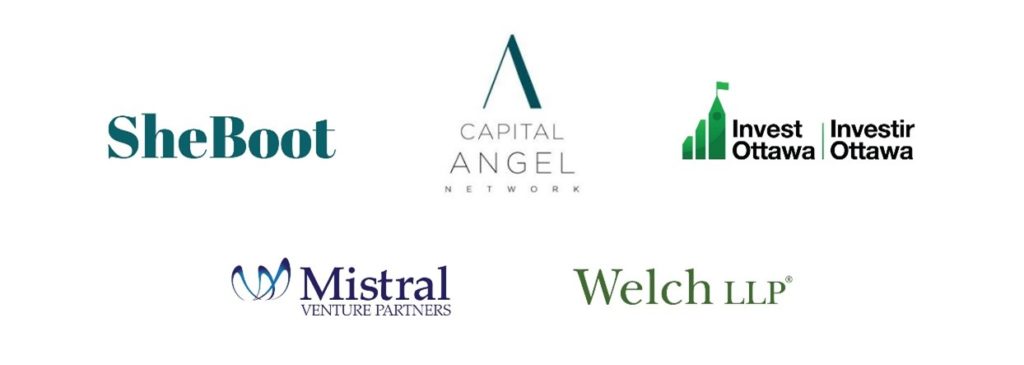 This featured story is brought to you by the Power of Why Podcast in collaboration with Invest Ottawa, with critical support from BDC Capital’s Thrive Venture Fund and Title Sponsor of International Women’s Week. We teamed up to produce this special series to celebrate women leading in Ottawa for International Women’s Week (IWW 2023) and shine the spotlight on our IWW 2023 featured leaders to unpack their passion and purpose.
This featured story is brought to you by the Power of Why Podcast in collaboration with Invest Ottawa, with critical support from BDC Capital’s Thrive Venture Fund and Title Sponsor of International Women’s Week. We teamed up to produce this special series to celebrate women leading in Ottawa for International Women’s Week (IWW 2023) and shine the spotlight on our IWW 2023 featured leaders to unpack their passion and purpose.
Each year, five inspirational leaders are selected to represent International Women’s Week. They are role models achieving a significant impact on our economy, community and society, and embody the spirit, goals and values of IWW.
What ever happened to job security?
From the Great Resignation to mass layoffs, workers are struggling to find their fit in this ever-changing market.
To succeed, shift gears.
Focusing not on your next job but your career instead, you’ll gain the skills, network and experience to reach your most audacious goals — no matter where you work.
Certified Career Coach, Resume Strategist, Founder of WeApply and one of Canada’s Top 100 Black Women to Watch, Lissa Appiah shares how.
Listen to the episode on Spotify / Apple Podcasts / Google Podcasts
This episode is for you if:
- You want to make a career change but don’t know where to start
- You’re looking for work in a new country with different cultural norms
- You’d like to grow your professional network
- You want to get better at pitching yourself to employers
Looking for a specific gem?
[3:50] What it means to “live between the hyphen”
[6:55] Helping her parents as a teen shaped Lissa’s career
[7:47] Undermined and overlooked: an immigrant experience in high school
[10:50] Upgrade your mindset to build the life you want
[13:38] Why advocating for yourself at work can be a cultural barrier
[17:20] To make the right career move, make yours a targeted job search
[18:05] Get crystal clear about what you want
[21:56] The anatomy of a cold pitch (that they’ll actually reply to)
[25:15] Does job security really exist?
[26:50] Your career is a body of work that evolves with you
[29:11] Align what you offer with what the market needs today
[31:40] How can employers retain talent?
[38:08] Steal this: Lissa’s strategy for prioritising personal development
[40:45] Losing money on coaches taught Lissa what not to do in her business
[44:00] “I can do hard things,” from networking as an introvert to building a business alone
[46:00] What does AI mean for the coaching industry?
Listen to the episode on Spotify / Apple Podcasts / Google Podcasts
Tune in to the podcast or take the time to digest each article found below. Regardless of the format, there’s great content in store for you!
Naomi Haile:
How did you grow up, and how has that informed who you are today?
Lissa Appiah: I was born in Montreal, Canada. My family’s from Ghana. My parents immigrated in the 80s. I’m Ghanaian, but I’m also Canadian and from Quebec, which is a completely different identity.
I took a sociology course in university called “living between the hyphen,” which is about this dual identity. I only went to Ghana for the first time in 2010. There was that shock because I’ve always identified as Ghanaian, but in Ghana I’m a foreigner.
This has made me adaptable to different situations and types of people. I have more empathy, especially coaching people through their careers.
A lot hangs on their job, whether it’s being able to stay in Canada for their immigration status, buy a house or just feed their family.
Naomi: What led you to start WeApply?
Lissa: I’ve always been the person people send their resumes to, or come to for interview prep. I helped my parents with their resumes as a teenager. I understand career development and how to increase my visibility in the workplace to advance.
Over time, I realised a gap in career development: nobody looked like me.
In high school I got advice that underestimated me. Many of my clients have said the same thing, where a career counsellor told them to go to college when they wanted to go to university.
Having had a career in HR means the strategies and lessons I learned can help my clients succeed. Sometimes I wonder if I should have started my business earlier, but this helped me do my job.
Naomi: How do people need to shift their mindset to progress in their career?
Lissa: Recognize your worth. This may take time if you’ve had people negatively impact how you perceive yourself, but recognizing your skills are the first step.
You can’t convince an employer you’re right for the job if you don’t believe it yourself. Reflect on your career, recognize your skills, and get comfortable articulating them to others.
A lot of clients know what they’ve accomplished but see it as just “doing their job,” but the workplace requires self-promotion. People may feel like it’s bragging, but you’re not saying you’re better than someone else. You’re simply presenting the facts, what you’re qualified to do.
Culture makes a difference. People who are of African or Caribbean descent grew up thinking about the collective, not about yourself. It’s about what we’ve done as a group.
When they come to Canada, they’re in a workplace where they’re expected to talk about themselves. That’s uncomfortable.
Naomi: What would you say to people who’ve lost their job, or are starting to think about how to market themselves?
Lissa: Understand where you are now, and where you want to be: in terms of your skills, qualifications and achievements. Take the time to reflect and write them down.
Free career assessment sites like O*NET and government resources can help you get a sense of what you can offer, and what you want.
Sometimes you just need a job, but never lose sight of your ultimate goal. Get clear on the industry you want to focus on. Create a list of 10, 15 companies you can research, find out who works there, and expand your network.
Get clear on job titles. There might be a position for a financial analyst that one company calls an “investment analyst.”
Get clear on the position and its responsibilities so you can bridge the gap: working on specific skills, getting a certificate or degree, and connecting with people in those roles.
They may not want someone who is super seasoned because they want fresh perspectives. Do your research, talk to people in the industry, expand your network, and use LinkedIn.
Don’t make assumptions. I’ve seen people go back to school and invest thousands of dollars only to not land a role because they don’t know how to articulate their skills.
Naomi: How do you connect with people who have the roles you want?
Lissa: View it not as an opportunity to get a job, but a way to build a relationship and gain insight for the long-term. The person you meet may not have a job for you, but they may know someone else who does.
Don’t make it about you, but about them. They’re giving you their time, so what do they have to gain? How will you give them value?
When you reach out, say why you want to connect. It can be something as simple as “I watched your YouTube video and learned a lot about this,” or “I’m exploring an opportunity with so-and-so company.”
Just complimenting someone’s blog has opened doors to so many of my clients, but this isn’t always the case. Sometimes people don’t answer.
Keep going until you find the right person, because often it only takes one. Maybe they put you in touch with another person or resource.
Naomi: My mentor told me that when you reach out to people, do it with a clear ask. Show that you’ve done your research.
Lissa: If I don’t know you, and you ask me to be your mentor, it’s not going to work. You don’t randomly select someone and send them a message.
Naomi: Do you think job security really exists, especially in 2023?
Lisa: The concept has evolved from 30 years ago, when people would stay in the same job throughout their career. Now we should view things more at the career level as opposed to the job level.
Someone may get laid off, or they may only stay in a role for a year and a half before moving on. The market is filled with precarious contracts, part-time or temp work.
It’s more about what you want in your career. Are you fulfilling your goals? Then yes, you have job security.
As you evolve, so will your career. As long as you have that connection with your work it doesn’t matter what the specific job is.
Naomi: How can people position themselves for their next career move?
Lissa: Understand what you have to offer, and what the market is looking for.
You may have an incredible skill set but it’s not what the market is looking for right now. It’s the same basic economic principles for supply and demand.
You will need to upskill, and you may need to evolve, to stay relevant with what’s in demand. Think of the shift with AI.
Naomi: What is the biggest challenge and opportunity you see with talent retention?
Lissa: Build a culture where career development is included. Tons of studies show it attracts and retains talent.
Often professionals don’t feel supported by their organisation to gain the tools they need to advance in their careers. Sometimes they’ll even say that they feel their managers are holding them back, to keep them in that position.
People grow out of their roles. Organisations must create succession planning accordingly. Someone may stay in a junior role for only two, three years.
Implementing tools like this enables you to keep talent within your organisation, so that knowledge, expertise and corporate investment isn’t lost.
Naomi: What excites you most about the future of business?
Lissa: Coming out of the pandemic, the Future of Work includes remote work, AI, hybrid work. What will that look like?
I wasn’t surprised to see a study showing that the four-day work week works extremely well. With this societal shift, employers and hiring managers need to shift their mindsets too.
The coaches that I work with are people of colour, and they tend to be the people we collaborate with as well. I hosted a workshop on personal branding, and at the end of it someone came up to me and said, at first, they weren’t interested, until they saw me, and got excited that I’d be offering a different perspective.
Open the door to voices that align with what the workforce looks like now.
That’s where my company can make a difference, because our perspectives are different from what has conventionally been deemed as “acceptable” or “the norm” at work.
Naomi: As a CEO, what are some non-negotiable items that you put in place to level up?
Lissa: Saving time in my calendar for my own professional development. When you’re managing a business, it’s easy not to get up to speed on the state of the market or the workforce.
I block off time every week to read or participate in a course and catch up on news. I set up Google Alerts for certain keywords and go through those articles.
I’m part of different associations and organisations that help me stay up-to-date with my certifications. As practitioners, we have to stay relevant and remain certified. I also have an executive coach. Find the resources and people that can help you get to that next level so you’re not stagnant.
Naomi: What’s the best investment you’ve made in yourself, on a professional level?
Lissa: I wasted a lot of money on coaching. You have to find the program and person that works for you. I shouldn’t say wasted because everything is a learning opportunity.
Even when I hired someone that didn’t deliver, I learned for myself what I didn’t want in my coaching practice.
People aren’t numbers, I want to work with them on a personal level. Experiencing that from another coach gave me that perspective.
Some of the best investments I’ve made have been group coaching programs that I joined early in my business. At the time, I had a concept of what I wanted to do, but wasn’t sure what it would look like. I didn’t have many examples.
I joined an American group, which was very diverse, and met successful career practitioners. Learning from them was a game changer.
Naomi: What did building a business teach you about yourself?
Lissa: I realised that I can do hard things. I tell myself that often, even in the gym. It motivates me to keep going. I faced so many obstacles.
Being an entrepreneur is glamorised but it’s not easy.
I thought that I’d make some Instagram posts and get a ton of clients that fit. There’s so much more to it. I’ve learned so much.
I can open WordPress and create a website. I know email marketing and social media management. I have people working with me, but if they weren’t there, I could pick it up and do it myself.
Being an entrepreneur has pushed me to step out of my comfort zone as an introvert, to attend networking events by myself, to not rely on anyone else. I put myself out there and built my brand on LinkedIn. Being vulnerable with others has been the biggest thing.
Naomi: What is one thing in your industry that you’re keeping an eye on?
Lissa: AI, especially ChatGPT. In career development, does this mean we need resume writers anymore? Do we even need coaching? It’s opening a door for people who may not be able to access coaching. It’s definitely a luxury.
I think these tools will improve, but not replace, our work.
People and Resources Mentioned in This Episode
Connect with Lissa
- Instagram – @weapply.careerservices
- LinkedIn – Lissa Appiah
- Website – weapply.ca
About the Power of Why Host, Naomi Haile

An intrapreneur, consultant, and interviewer.
Naomi Haile is curious about people, their paths and what drives them. In 2017, she launched the Power of Why Podcast. Her guests have taken the non-linear path in business, venture capital and other creative professions to share their story. Each episode explores people’s philosophy on life and work.
As we all navigate our lives and careers, Naomi hopes that everyone she connects with – guests and listeners – can shape products, companies, and communities of impact.
Naomi is a consultant at QuakeLab. She recently graduated from Columbia University, studying Human Capital Management.
Connect with Naomi
-
Website: naomihaile.com
-
Instagram: @naomiahaile
-
Twitter: @naomiathaile
-
LinkedIn: Naomi Haile
In support of its Women Founders and Owners strategy, Invest Ottawa offers programs and services that enable and accelerate the growth and success of women entrepreneurs from every walk of life. Visit www.investottawa.ca/women to learn more!







